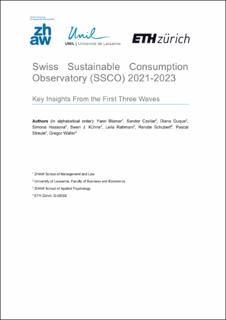Please use this identifier to cite or link to this item:
https://doi.org/10.21256/zhaw-2496Full metadata record
| DC Field | Value | Language |
|---|---|---|
| dc.contributor.author | Blumer, Yann | - |
| dc.contributor.author | Czellar, Sandor | - |
| dc.contributor.author | Duque, Diana | - |
| dc.contributor.author | Haasova, Simona | - |
| dc.contributor.author | Kühne, Swen J. | - |
| dc.contributor.author | Rahmani, Leila | - |
| dc.contributor.author | Schubert, Renate | - |
| dc.contributor.author | Streule, Pascal | - |
| dc.contributor.author | Waller, Gregor | - |
| dc.date.accessioned | 2024-04-08T15:03:50Z | - |
| dc.date.available | 2024-04-08T15:03:50Z | - |
| dc.date.issued | 2024-04 | - |
| dc.identifier.uri | https://digitalcollection.zhaw.ch/handle/11475/30425 | - |
| dc.description.abstract | On an aggregate level, individual consumer choices in a wide range of areas strongly shape a society’s environmental footprint. Decision-makers in policy, society, and industry who aim to promote more sustainable consumption patterns need a thorough understanding of how consumers make decisions in different consumption domains. The Swiss Sustainable Consumption Observatory (SSCO) is a synthesis activity of the National Research Programme NRP73 (Sustainable Economy). It investigates sustainable consumption patterns in Switzerland, focusing on three areas of consumption relevant from an environmental impact perspective and where individuals have considerable latitude regarding their behavior. These are food, consumer electronics, and textiles. The core of the SSCO consists of three waves of a repeated cross-sectional survey of Swiss residents. These were conducted between 2021 and 2023 across the major linguistic regions with about 1200 respondents each. Behavioral patterns and barriers were largely stable over the three waves. However, minor shifts can be observed, such as a shift in the purchasing channel of consumer electronics (increasing share of online purchases) and in the willingness of consumers to purchase secondhand electronic devices and clothes (increases slightly). More importantly, the findings show that behaviors and the perceived barriers to them differ considerably between the consumption domains (food, electronics, and textiles) and even within them (e.g., different food items). For instance, participants found it much easier to identify sustainable behavior when making food purchases rather than textiles or consumer electronics. This highlights the need to understand the specific issue and decision contexts to identify and implement measures that promote sustainable consumption. | de_CH |
| dc.format.extent | 26 | de_CH |
| dc.language.iso | en | de_CH |
| dc.publisher | ZHAW Zurich University of Applied Sciences | de_CH |
| dc.rights | http://creativecommons.org/licenses/by-nc/4.0/ | de_CH |
| dc.subject | Sustainable consumption | de_CH |
| dc.subject | Environmental psychology | de_CH |
| dc.subject | Electronics | de_CH |
| dc.subject | Textile | de_CH |
| dc.subject | Food | de_CH |
| dc.subject | Secondhand | de_CH |
| dc.subject | Dragons of climate inaction | de_CH |
| dc.subject | Psychological barrier | de_CH |
| dc.subject | National Research Programme 73 | de_CH |
| dc.subject | Sustainable economy | de_CH |
| dc.subject.ddc | 658.8: Marketingmanagement | de_CH |
| dc.title | Swiss Sustainable Consumption Observatory (SSCO) 2021-2023 : key insights from the first three waves | de_CH |
| dc.type | Working Paper – Gutachten – Studie | de_CH |
| dcterms.type | Text | de_CH |
| zhaw.departement | Angewandte Psychologie | de_CH |
| zhaw.departement | School of Management and Law | de_CH |
| zhaw.organisationalunit | Institut für Innovation und Entrepreneurship (IIE) | de_CH |
| zhaw.organisationalunit | Psychologisches Institut (PI) | de_CH |
| dc.identifier.doi | 10.21256/zhaw-2496 | de_CH |
| zhaw.funding.eu | No | de_CH |
| zhaw.originated.zhaw | Yes | de_CH |
| zhaw.webfeed | PI - Umwelt- und Nachhaltigkeitspsychologie | de_CH |
| zhaw.author.additional | No | de_CH |
| zhaw.display.portrait | Yes | de_CH |
| zhaw.relation.references | https://osf.io/qzmwg | de_CH |
| Appears in collections: | Publikationen Angewandte Psychologie Publikationen School of Management and Law | |
Files in This Item:
| File | Description | Size | Format | |
|---|---|---|---|---|
| 2024_Blumer-etal_Swiss-Sustainable-Consumer-Observatory.pdf | 4.46 MB | Adobe PDF |  View/Open |
Show simple item record
Blumer, Y., Czellar, S., Duque, D., Haasova, S., Kühne, S. J., Rahmani, L., Schubert, R., Streule, P., & Waller, G. (2024). Swiss Sustainable Consumption Observatory (SSCO) 2021-2023 : key insights from the first three waves. ZHAW Zurich University of Applied Sciences. https://doi.org/10.21256/zhaw-2496
Blumer, Y. et al. (2024) Swiss Sustainable Consumption Observatory (SSCO) 2021-2023 : key insights from the first three waves. ZHAW Zurich University of Applied Sciences. Available at: https://doi.org/10.21256/zhaw-2496.
Y. Blumer et al., “Swiss Sustainable Consumption Observatory (SSCO) 2021-2023 : key insights from the first three waves,” ZHAW Zurich University of Applied Sciences, Apr. 2024. doi: 10.21256/zhaw-2496.
BLUMER, Yann, Sandor CZELLAR, Diana DUQUE, Simona HAASOVA, Swen J. KÜHNE, Leila RAHMANI, Renate SCHUBERT, Pascal STREULE und Gregor WALLER, 2024. Swiss Sustainable Consumption Observatory (SSCO) 2021-2023 : key insights from the first three waves. ZHAW Zurich University of Applied Sciences
Blumer, Yann, Sandor Czellar, Diana Duque, Simona Haasova, Swen J. Kühne, Leila Rahmani, Renate Schubert, Pascal Streule, and Gregor Waller. 2024. “Swiss Sustainable Consumption Observatory (SSCO) 2021-2023 : Key Insights from the First Three Waves.” ZHAW Zurich University of Applied Sciences. https://doi.org/10.21256/zhaw-2496.
Blumer, Yann, et al. Swiss Sustainable Consumption Observatory (SSCO) 2021-2023 : Key Insights from the First Three Waves. ZHAW Zurich University of Applied Sciences, Apr. 2024, https://doi.org/10.21256/zhaw-2496.
Items in DSpace are protected by copyright, with all rights reserved, unless otherwise indicated.